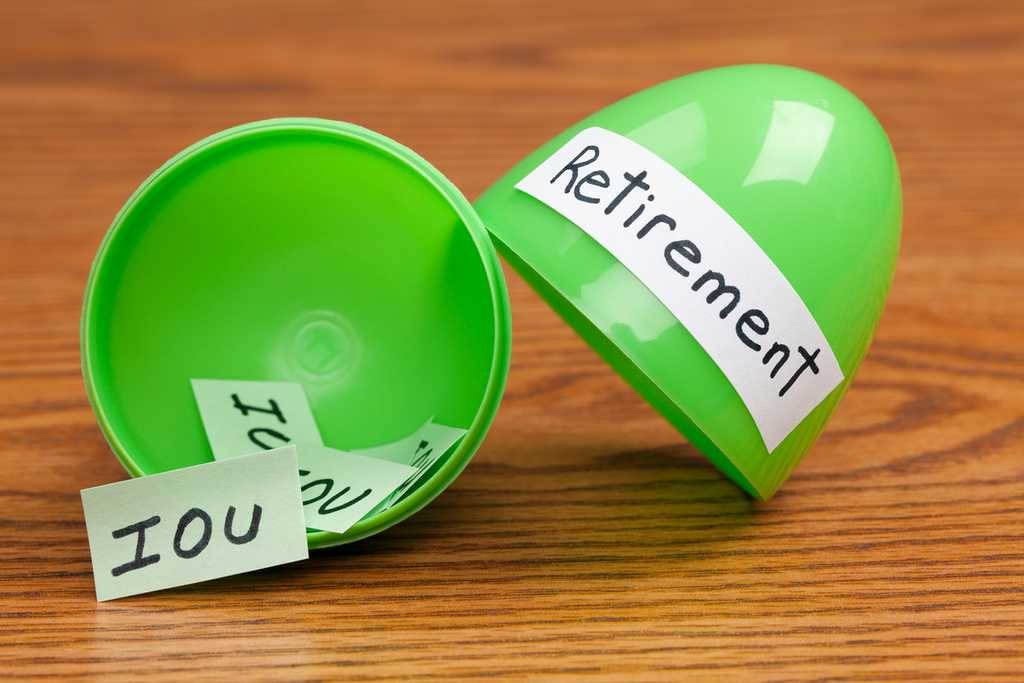Saving for retirement is made easy through employer-sponsored retirement plans known as a 401(k). Contributions are automatically made from your paycheck and some companies even provide a matching contribution to incentivize employee participation. While this money is designated for retirement and there are penalties for withdrawing money, most companies allow their employees to borrow from their accounts. In this article, we'll discuss how 401(k) loans work, the pros and cons of taking a loan, and alternatives you should consider.
Can you borrow from your 401k?
While you cannot withdraw from a 401(k) without paying interest and penalties, most 401(k) plans offer loans. To get a firm answer to this question about your 401(k) plan, you'll need to speak with your company's human resources or plan administrator. You can also log into your 401(k) account online to verify if this is an option for you.
Unlike a traditional loan from a bank or other lender, there are no credit requirements to borrow from a 401(k). As long as this feature is available and you have a large enough balance, you can qualify for a 401(k) loan. Additionally, 401(k) loans are not reported to the credit bureaus. Because of this, they will not build your credit, nor should they affect your ability to qualify for other loans.
In some states, your spouse may have to sign off on the 401(k) loan due to community property rules. This ensures that one spouse doesn't spend money that they may have a claim to in case of a divorce.
How much can you borrow from your 401k?
By law, 401(k) loans are limited to $50,000 or 50% of your account balance, whichever is less, within a 12-month period. However, the actual maximum amount you can borrow from your 401(k) may be less, depending on what your plan allows. Some plans also have a minimum loan amount that can be requested.
Borrowers may be able to take out multiple 401(k) loans, as long as they adhere to the loan limits stated above. However, some companies require you to pay back the first loan before allowing a second loan.
How does a 401k loan work?
When you take out a 401(k) loan, that portion of your balance is liquidated from your investments. Typically this is done proportionately from each of your different investments. Some plans allow you to designate which investments to use for the loan.
The loan proceeds are either deposited into your bank account or a check is mailed to your home address. Once the funds are in your bank account, there are no restrictions on how that money can be spent.
The typical 401(k) loan term is five years, which is the maximum repayment term that the government allows. However, you can request a shorter term, you may be able to request one. If you are using the money to buy a home, some plans allow your loan to be up to 25 years.
Your loan payments are generally taken automatically from your 401(k) contributions each pay period. By law, you must make at least one substantially equal payment every quarter.
401(k) loans charge interest on the outstanding balance. Generally, the rates are 1% to 2% higher than the Prime Rate. The interest that you pay is credited to your 401(k) account, so you are actually paying yourself the interest on the loan. These interest payments help to offset the loss of market returns on the amount liquidated to fund your loan.
You may be able to repay the loan early through a lump-sum payment or by increasing your payroll contributions. Check with human resources or your plan administrator to understand the specific rules for your plan. Some plans only allow 401(k) loan payments to be made through payroll deductions.
Why take a 401(k) Loan?
When you need cash and are having trouble getting approved for a loan, taking out a 401(k) loan may seem like a good idea. These loans have fairly generous repayment terms and are not contingent upon credit approval. You can apply for up to $50,000 without worrying if a bank is going to stick you with a high interest rate or decline your application.
Although a 401(k) loan is not ideal compared to some alternatives, it is better than others. These are some common reasons when a 401(k) loan makes sense:
- Need the money for the short term. If you can repay the loan in less than a year, it makes sense to avoid loan fees or higher interest rates of some loan options.
- Avoiding a payday loan. When a payday loan is your only other alternative, a 401(k) loan helps you avoid predatory fees and interest rates charged by payday lenders.
- Your credit score is bad. Some people have such a high debt that their credit scores are trashed. Taking out a 401(k) loan allows you to pay down your debt and reduce your credit utilization and improve your credit score. Once your score is higher, you might be able to qualify for better rates and terms from a traditional lender to repay your 401(k) loan.
- Down payment for a home. Normal 401(k) loans must be repaid within five years. But, when you borrow from your 401(k) to buy a home, you can stretch the payments out for up to 25 years.
Pros and Cons of a 401(k) Loan
Before taking out a 401(k) loan, it is crucial that you understand the pros and cons of this decision. While a 401(k) loan can help you out in a time of need, doing so can negatively impact your ability to be prepared for retirement.
Pros
- Does not require a credit check or impact your credit report
- Funds are normally received very quickly
- Loan repaid through normal 401(k) contributions
- Interest on the loan is repaid to your 401(k)
- May allow multiple loans, depending on plan guidelines
Cons
- Not all 401(k) plans allow loans
- Limited to $50,000 or 50% of balance every 12 months
- Lose out on investment returns while loan is outstanding
- Must be repaid if you leave the job, otherwise treated as a withdrawal
How to borrow from your 401k
If you've decided that borrowing from your retirement plan is right for you, here's how to get money from a 401(k) loan.
- Determine how much you want to borrow. Remember that you can borrow up to $50,000 or 50% of your account balance, whichever is less.
- Think about how long it will take you to repay it. You have up to five year to repay the money in most situations. However, you can repay it sooner without penalty. Using a tax refund or increasing payments when you get a raise are both excellent strategies to accelerate your loan payoff.
- Complete your 401(k) loan application. Each company is different, but, generally, you can apply online or by contacting your plan administrator.
- Receive money from your 401(k). In most cases, the money can be directly deposited into your bank account. Alternatively, you'll be mailed a check to your home address.
Alternatives to 401(k) loans
Instead of taking out a 401(k) loan, there are other options to consider that have less of an impact on your retirement savings. Here are the most common alternatives to a 401(k) loan:
- 0% APR introductory offer from a credit card. Many credit cards offer a 0% promotional offer when you apply for a new card. These introductory offers can be for purchases, balance transfers, or both. Some of these interest-free periods last for almost two years.
- Home equity loan. A home equity line of credit (HELOC) or home equity loan provides access to cash at an attractive interest rate. These loans spread out your payments over a longer period of time, which keeps your monthly payments low. They work great if you already have a low-interest mortgage and don't want to refinance.
- Cash-out refinance on your home. With home prices rising, more homeowners have equity in their homes. Refinancing your home and pulling cash out can lock in ultra-low interest rates while providing you with the cash that you need.
- Borrow against cash value life insurance. If you have a cash value life insurance policy, you may be able to borrow against the cash value at attractive rates. These loans don't require a credit check and are approved very quickly. The only downside is that these loans can reduce your death benefit if you pass away before the loan is repaid.
- Apply for a personal loan. While personal loans have a higher interest rate than a 401(k) loan, they allow your retirement savings to continue to grow. Credit unions and online lenders may offer lower rates than a traditional bank. Consider peer-to-peer lending platforms as well for potentially better terms and rates.
- Start a side hustle. While starting a side hustle won't deliver a big pile of cash immediately, it will create a stream of income that can be used to pay off debt or handle expenses over time. Once your immediate cash need is over, the side hustle can help rebuild your savings, accelerate debt payoff, and increase your retirement savings.
- Contact your local non-profit credit counseling agency. Avoid high-cost debt consolidation companies and reach out to non-profit credit counseling agencies. Their job is to help you evaluate your budget and negotiate with creditors so that you can repay your debts.
- Speak with a bankruptcy attorney. Filing bankruptcy is a last resort, but it may be the right option based on your financial situation. Many retirement accounts, like a 401(k), are protected from creditors, so you should be able to keep the account if you file bankruptcy.
Frequently Asked Questions
How long do you have to repay a 401(k) loan?
Under Federal law, the maximum term of a standard 401(k) loan is five years. This timeframe can be extended up to 25 years when the funds are used to purchase a home. If your finances change, you may be able to repay the loan early.
What happens if you leave your job?
If you leave your job with a 401(k) loan outstanding, you must repay the loan within 90 days. Otherwise, the remaining loan balance will be treated as a distribution and you'll owe taxes and a 10% early withdrawal penalty on that amount. You will not be able to replace those withdrawals later on when you have more money. That means that you'll also lose out on tax-deferred growth for that money that is offered through your 401(k).
How to pay off a 401k loan early
Most 401(k) loans have a 5-year term. You can repay your 401(k) loan early through a lump-sum payment or by increasing your payroll deductions. Each plan is different, so discuss your options with human resources or your 401(k) plan administrator.



